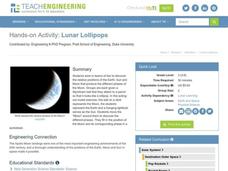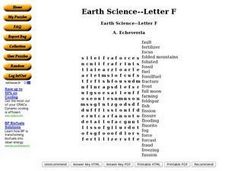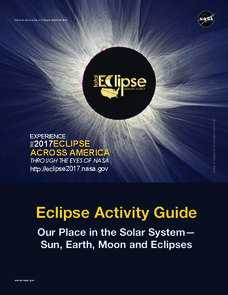Curated OER
The Moon Book
In this moon worksheet, students read the book The Moon Book and list facts about the moon and draw eclipses. Students list 10 facts and draw 3 kinds of eclipses.
Curated OER
Soaring Through Space With a Kid Pix Slide Show
First graders create a slide show on Kid Pix about space. In this space lesson plan, 1st graders will explore the earth, sun, moon, and planets. After exploring their motions and locations around the sun, they create a 4 page slide show...
Curated OER
Calculating the Moon's Width
Sixth graders measure the width of the Moon. In this Moon measurement lesson plan, 6th graders observe the Moon and complete a formula to calculate the width of the Moon.
Curated OER
Lunar Lollipops
Students work with a partner, Styrofoam ball and light source to simulate the positions of the Earth, Moon and Sun at various stages during the phases of the Moon. They describe why the Moon is visible from Earth and complete a worksheet.
Curated OER
Lunar Lollipops
Students simulate the phases of the moon using a lamp and styrofoam balls. In this lunar phases lesson, students stand around a lamp and act as Earth. They hold styrofoam balls and rotate to show the phases of the moon.
Curated OER
Our Solar System
In this solar system worksheet, students complete a database comparing the 9 different planets' mass, surface temperature, rotation period, orbital period, moons, and distinguishing features. This worksheet is a graphic organizer.
Curated OER
28 Days - The Lunar Cycle time line
Third graders create a labeled lunar diagram time line illustrating the lunar cycle using Internet resources. An assigned date/month is given to each student, and an online Moon Phase calculator assists them with their drawings.
Curated OER
A View Of Home From The Front Door and From Space
Students discover how distance can change how our view of an object. Students build a representative model of where their home is located from different distances. They create three drawn models of their home from various elevations as...
Curated OER
Why do Stars Rise in the East?
In this stars rise in the east learning exercise, students use geometry to show how the Earth rotates from west to east and why celestial bodies appear to rise in the east and set in the west. Students draw a figure and label given...
Curated OER
Wax On, Wane Off
Young scholars explore the Earth's only natural sattelite, the moon. They view a demonstration using tennis balls of the waxing crescent moon, waxing gibbous moon and a lunar eclipse.
Curated OER
Earth Science--Letter "F"
In this earth science worksheet, learners locate and identify vocabulary terms related to earth science that begin with the letter "F." There are 24 words located in the puzzle.
Curated OER
The Planet Earth
Students explore the planet Earth, outer space, and Earth's axis. They demonstrate reading comprehension skills, including literal meaning, inference and critical analysis.
University of Colorado
The Jovian System: A Scale Model
Jupiter has 67 moons! As the seventh in a series of 22, the exercise shows learners the size and scale of Jupiter and its Galilean moons through a model. They then arrange the model to show how probes orbited and gathered data.
NASA
Eclipse Activity Guide
Ever made solar s'mores? Or recreated the solar system using peanuts? Astronomers young and old investigate all things solar using a variety of activities. Explore how the sun works, types of light it emits, and methods of charting the...
American Museum of Natural History
Field Trip: Space Flight
Take a virtual trip to infinity and beyond. Pupils watch a space visualization that leaves Earth and heads to the ISS and then follows the Apollo missions to the moon. Scholars view detailed images of the space station and its different...
Curated OER
Exploring the Far Side of the Moon
Help your classes better understand how our nearest celestial neighbor affects our world.
101 Questions
Speed of Light
How quickly does light travel long distances? A short video simulates light going from the earth to the moon at two different paces. Scholars relate the distance to the rate to understand which simulation is correct.
media.yurisnight.net
Science Lesson Plan: Our Solar System: I Wonder?
Ever wonder why Pluto isn't considered a planet? Or how large the Earth is compared to the other inner planets? Explore the universe with a series of projects that simulate different aspects of our solar system. The activities require...
American Museum of Natural History
What Do You Know About Astronomy
Develop an understanding of the universe. Learners answer 10 multiple choice questions about several topics in astronomy. Questions contain information about the age of the universe, gravitational attraction, galaxies, planets and comets...
Purdue University
Global Design for the Seasons
People don't all get the same amount of sun at the same time of the year. Collaborative groups explore how the motion of Earth contributes to the idea in an inquiry-based STEM instructional activity. Learners first investigate how the...
NOAA
The Great, Glowing Orb What You Will Do: Make a Solar Heat Engine
How is solar energy able to move wind and water to control the climate? Scholars explore the concept of solar energy in the first of 10 activities in the Discover Your Changing World series. They follow instructions to build homemade...
American Museum of Natural History
Cosmic Cookies
Scholars read about each planet then bake a plate of cosmic cookies—no-bake cookies decorated to look like the planets; Mercury, Venus, Earth, Mars, Jupiter, Saturn, Uranus, Neptune, and Pluto.
Super Teacher Worksheets
Our Solar System Scavenger Hunt Activity
Send students on a search for facts about the solar system with this scavenger hunt activity. Whether they are finding out how far the sun is from the earth, or the names of all four gas giants, this resource will engage young scientists...
Colorado State University
How Far Away Is Space?
Outer space may be a lot closer than you think! Science scholars model the layers of the atmosphere using transparencies to gain insight into the scale of space. The resource includes ideas to tailor the activity to the skill level of...
Other popular searches
- Earth Science Moon Phases
- Earth Moon Sun System
- Moon and Earth Movement
- Sun Earth and Moon
- Moon Earth
- Earth and Moon Relationship
- Compare Earth and Moon
- Sun Moon Earth
- Earth and Moon and Sun
- Earth, Moon and Sun
- Forces Earth and Moon

























